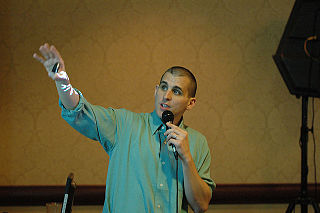A Quote by Abraham Lincoln
If I care to listen to every criticism, let alone act on them, then this shop may as well be closed for all other businesses. I have learned to do my best, and if the end result is good then I do not care for any criticism, but if the end result is not good, then even the praise of ten angels would not make the difference.
Related Quotes
If I were to try to read, much less answer, all the attacks made on me, this shop might as well be closed for any other business. I do the very best I know how - the very best I can; and I mean to keep doing so until the end. If the end brings me out all right, what's said against me won't amount to anything. If the end brings me out wrong, ten angels swearing I was right would make no difference.
You can be an artist without visual images, a reader without eyes, a mass of erudition with a bad elementary memory. In almost any subject your passion for the subject will save you. If you only care enough for a result, you will almost certainly attain it. If you wish to be rich, you will be rich; if you wish to be learned, you will be learned; if you wish to be good, you will be good. Only you must, then, really wish these things, and wish them with exclusiveness, and not wish at the same time a hundred other incompatible things just as strongly.
The temptation many creative people I know have is to strive for popularity. To make, do, and say things that other people like in the hopes of pleasing them. This motivation is nice. And sometimes the end result is good. But often what happens in trying so hard to please other people, especially many other people, the result is mediocre.
Jane Fonda, who divided her life into three acts, decided after her sixtieth birthday that she was now facing the final act, and came to the following conclusion: "I thought to myself, well if that's the case and if what I'm scared of isn't death, but getting to the end with regrets, then I've got to figure out what would be the things that I would regret when I got to the last act if I hadn't done them or achieved them by then. And they were: having an intimate relationship and having made a difference."
To me, there's a huge difference between criticism and reviewing. I really love reading good criticism of television and film. To me, a critic is someone who analyzes a show, describes it, talks about the people in it, puts it in historical context of other shows like it, compares it and stuff, and then talks about the intent of the show and whether it failed or didn't.
Pedants make a great rout about criticism, as if it were a science of great depth, and required much pains and knowledge--criticism however is only the result of good sense, taste and judgment--three qualities that indeed seldom are found together, and extremely seldom in a pedant, which most critics are.
Your agent or manager tells you. They go, "You're out. They're gonna get a new guy." But then I didn't feel bad. I didn't take it personally. Not that I'm competitive at all. But you have pride in that, you know? You want your ratings to be good. But now that I'm 62, I don't really care about the ratings. I don't care about the reviews. I care about the work, and I care about the people that I'm working with, and I try to make the experience for them and myself as good as it can be.
































